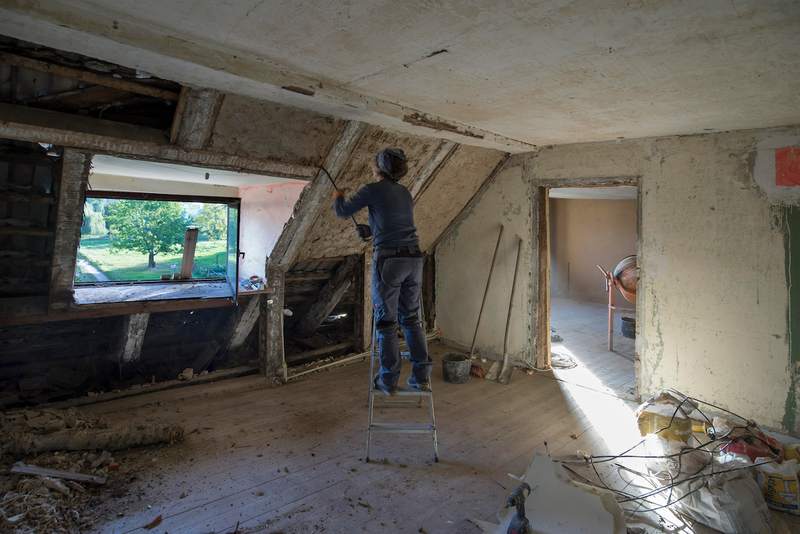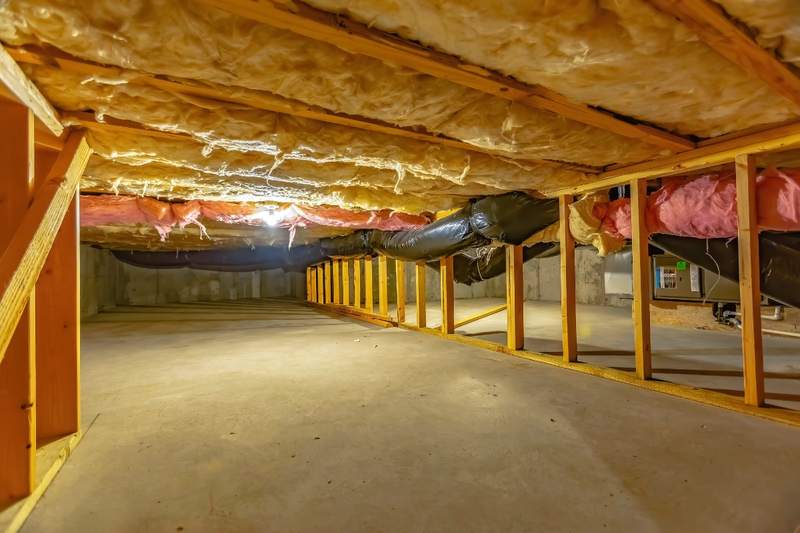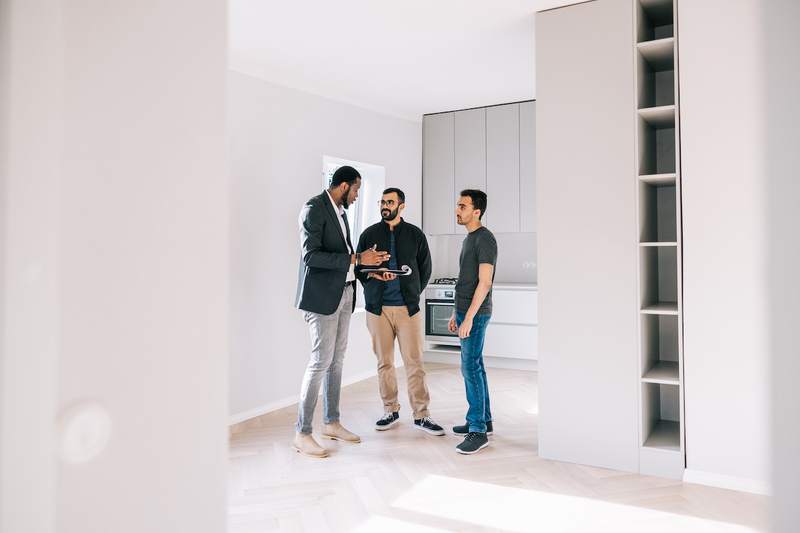
A fixer-upper home needs repairs and renovations, either to be suitable to live in, or to achieve the buyer’s desired level of comfort and functionality. While a fixer-upper home usually can be bought at a more affordable price, buyers need to understand what owning such a home involves, and be ready to make or pay for repairs or upgrades themselves.
Definition of a Fixer-Upper Home
A fixer-upper is a home that requires repairs and improvements to reach its market potential.
“These renovations could range from simple cosmetic updates like painting and flooring to more substantial structural repairs or system updates like plumbing, electrical, or HVAC,” says Joel Efosa, CEO of Fire Cash Buyers in Norwalk, Connecticut.
Such properties typically are more affordable than those that are more move-in ready, making them especially attractive to homebuyers who enjoy renovation work or are willing to pay for and live with the disruption of major repairs.
Improving a fixer-upper home can increase its market value greatly, providing a good return on the investment. But hiring contractors and making repairs can be expensive and time-consuming. If repairs cost too much, you may end up paying more for your fixer-upper home than you would have for a turnkey property.
When It Makes Sense To Buy a Fixer-Upper Home
Here are four scenarios in which it may make sense to buy a fixer-upper.
1. Low number of homes for sale
When the supply of homes for sale is low, prices will increase. Aspiring buyers may struggle to afford competitive bids in a seller’s market, and considering fixer-uppers would expand their options.
2. If you want to flip the home for a profit
Professional homebuyers often buy a fixer-upper home to renovate and sell for profit — a practice commonly known as house flipping. Popularized by home improvement TV shows, fixing up a home to either resell or rent can be profitable, but requires a lot of work and experience to ensure you don’t spend more on renovations than you can recoup.
3. You enjoy home renovations
Even if you hire contractors to do the work, it’s helpful to have an interest in or knowledge of home repairs. This will help you understand what’s being done, as well as allow you to make some repairs or upgrades yourself.
4. Availability of repair funds
Even if you make repairs yourself, you’ll need materials and tools. A common rule of thumb is to be sure you can set aside at least 1% of the home’s value each year for renovations if you’re considering a fixer-upper.
When To Avoid Buying a Fixer-Upper Home
Buying a home that requires investments beyond the purchase price is not the right move for everyone. Here are four conditions that suggest you might want to avoid buying a fixer-upper home.
1. Budget constraints
Renovations and repairs can quickly add up, and unexpected costs may arise during the process. It’s important to assess your financial situation and be sure you have enough money both to buy the home and to pay renovation and repair expenses.
2. Time constraints
Renovating a fixer-upper takes time. Consider whether you have the time and energy required to make or oversee renovations.
3. Lack of expertise
It may sound like a good idea to make repairs yourself. But making professional-level repairs requires the knowledge and skill that comes from experience. If you really don’t know how to renovate the kitchen, you’ll be better off paying professionals to do it for you.
4. Emotional stress
Renovating a home can be emotionally taxing, especially if unexpected issues arise during the process. It’s important to consider how well you handle stress, and whether you’re prepared for potential setbacks, delays, and extra expenses.
Steps To Buying a Fixer-Upper
The process of buying a fixer-upper is similar to buying a home that’s in good shape. A real estate agent can show you how to find a fixer-upper home and help you through the process. You’ll want to take some extra steps along the way to be sure you know what you’re buying.
1. Make a successful offer
Once you’ve found a home you want to buy, work with your real estate agent to make a competitive offer. It’s common for offers on a fixer-upper home to include contingencies that will allow the buyer to cancel the sale if the home appraisal or home inspection results are unsatisfactory. Once you and the seller agree on terms, you’ll sign a purchase and sale agreement.
2. Get a home inspection
It’s important to have a professional home inspection of the property as soon as possible. The inspector will assess the property’s condition and report any flaws or defects with its structural integrity, electrical systems, plumbing, and other major systems.
“It’s essential to be present during the inspection to ask questions and gain a better understanding of the property’s condition,” says Mike Qiu, a professional homebuyer in Bothell, Washington.
3. Estimate renovation costs
Once you know what needs to be repaired, you can estimate what it will cost to fix. On average, a full home renovation will cost somewhere in the range of $17,900 and $80,650.
“Consider things like the cost of materials needed for repairs or renovations, as well as the cost of labor to have the work completed,” says Jennifer Spinelli, a professional homebuyer in Denver.
4. Determine which permits you need
Local governments often require permits for home renovation work. You can expect to need permits for upgrades or renovations involving electrical systems, plumbing, and mechanical systems. Some cities may require permits for adding sheds or replacing stucco.
You can find basic info online about which permits your local governments require. A contractor also should be able to help you navigate the permit process.
5. Identify repairs you can make yourself
Again, it sounds great to say you plan to do the work yourself, but it’s important to be realistic about what you can take on, based on your skills, available time, and how much stress you can handle.
“Some fixer-uppers may only require minor do-it-yourself efforts, while others may demand professional contractors due to their complexity,” Qiu says.
6. Explore fixer-upper loan options
If you don’t have enough saved up to pay for repairs after you make a down payment and pay closing costs on a home, consider applying for a mortgage that allows you to buy the home and pay for repairs, such as a Federal Housing Administration 203(k) loan.
“One popular choice is the FHA 203(k) loan, which allows you to finance both the purchase and renovation costs into a single mortgage,” says Pete Evering, business development manager at Utopia Property Management in San Diego. “Another option is the Fannie Mae HomeStyle loan, a conventional loan that also combines the purchase and renovation expenses.”
Other loans to consider include:
- Veterans Affairs renovation loans.
- Freddie Mac CHOICERenovation loans.
- Freddie Mac CHOICEReno eXPress loans.
- U.S. Department of Agriculture renovation loans.
7. Close on the home
With your loan in place and all contingencies met, it’s time to make the down payment, pay closing costs, and take ownership of your new home. Then, it’s time to get to work on making those repairs.
FAQ
Here are answers to common questions about fixer-upper homes.











